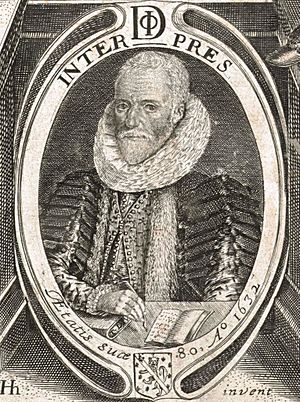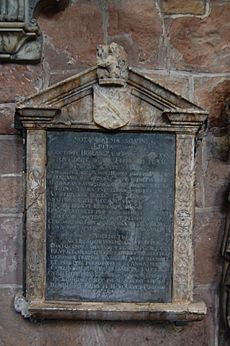Philemon Holland facts for kids
Quick facts for kids
Philemon Holland
|
|
|---|---|

Philemon Holland, aged 80. An engraving by William Marshall, from a drawing by Henry Holland, Philemon's son, published in Philemon's translation of Xenophon's Cyrupaedia (1632).
|
|
| Born | 1552 |
| Died | 9 February 1637 (aged 84–85) |
| Spouse(s) | Anne Bott |
| Children | Abraham Holland Henry Holland Compton Holland William Holland six other children including two unmarried daughters |
| Parent(s) | John Holland, mother's name unknown |
Philemon Holland (born 1552, died 1637) was an English teacher, doctor, and translator. He is famous for being the first person to translate important books by Livy, Pliny the Elder, and Plutarch into English. He also translated William Camden's Britannia from Latin into English.
Contents
Early Life and Family
Philemon Holland was born in Chelmsford, Essex, in 1552. His father, John Holland, was a priest. John Holland had to leave England for a while during the reign of Queen Mary I. This was because Catholicism was brought back to England at that time.
When Queen Elizabeth I became queen in 1558, his father returned. He became a priest and worked in Great Dunmow, Essex, until he died in 1578.
Education and Career
Philemon Holland went to King Edward VI Grammar School in Chelmsford. Around 1568, he started studying at Trinity College, Cambridge. There, he earned his first degree in 1571. He became a Fellow at Trinity College, which meant he was a junior teacher or researcher.
In 1579, Holland got married, and because of the rules at the time, he had to leave his position at the college. He moved to Coventry with his wife, Anne Bott.
Teaching in Coventry
In Coventry, Holland became an assistant teacher at King Henry VIII School. This job gave him a house and a small income.
He continued his studies and received a Master of Arts degree from Oxford in 1585. In 1597, he earned a Doctor of Medicine degree from Cambridge. This meant he was also a qualified doctor.
Holland became a respected citizen of Coventry. In 1617, when King James visited the city, Holland was chosen to give a speech to the King. People said his speech was "much praised."
Later in his life, around 1613, Holland also tutored George Berkeley, who lived nearby.
Later Years
When he was 77 years old, in 1628, the leaders of Coventry made Holland the head schoolmaster. They did this to show respect for his skills and service to the city, and to help him financially. However, he only kept the job for 14 months because of his age.
By 1632, Holland's health and finances were not good. The city of Coventry gave him a small pension to help him. In 1635, the University of Cambridge also asked its colleges to help him financially.

Philemon Holland died in Coventry on February 9, 1637. He was buried at Holy Trinity Church. His wife, Anne, who died in 1627, is also buried there.
Famous Translations
Philemon Holland was a very busy person. He taught, practiced medicine, and translated many important books.
Early Major Works
His first published translation was The Romane Historie (1600). This was the first complete English translation of Livy's famous Latin history of Rome, Ab Urbe Condita. It was a huge book, over 1400 pages long, and he dedicated it to Queen Elizabeth I. Holland wanted his translation to be clear and easy to understand. It was known for being accurate and lively.
In 1601, Holland published another very large translation: Pliny the Elder's The Historie of the World. This book was an ancient encyclopedia of knowledge about the natural world. It had never been translated into English before. Many people loved this translation, and some experts today still think it's excellent.
In just four years, from 1600 to 1603, Holland published over 4000 pages of high-quality translations!
More Important Books
In 1603, he translated Plutarch's Moralia, which he called The Philosophie, commonly called, the Morals. This was the first English translation of this Greek work. Holland famously said he wrote the entire book using just one goose quill pen!
Three years later, in 1606, he translated Suetonius's De Vita Caesarum, which he called The Historie of Twelve Caesars. This book told the stories of the Roman emperors.
In 1609, he translated parts of Ammianus Marcellinus's history of the Roman Empire. The city of Coventry even helped pay for this publication.
Translating Britannia
In 1610, Holland translated William Camden's famous book Britannia into English. This book described the history and geography of Great Britain. Holland worked on this project, and Camden himself added new information to the English version.
Holland also translated other works, including a Latin dictionary supplement in 1615 and a Latin translation of John Speed's The Theatre of the Empire of Great Britaine in 1616. In 1617, he translated a medical text called Regimen Sanitatis Salerni.
His last major translation was Xenophon's Cyropaedia, which was published in 1632. This book was about the education of Cyrus the Great.
Holland's Translation Style
Holland's translations were known for being free and easy to read, almost like everyday speech. He sometimes used older words or words from different parts of England. He often added more words to his translations to make them clearer. He explained that he wanted to use a "mean and popular stile," meaning a simple style that even a "basest clowne" (a common person) could understand.
His Reputation
During his lifetime, Philemon Holland was highly respected for his many excellent translations. People even made a funny poem about him: Phil: Holland with translations doth so fill us, He will not let Suetonius be Tranquillus
Thomas Fuller, a writer from the 1600s, called Holland "the translator general in his age." He said that Holland's translated books alone could fill a country gentleman's library with history books.
Even though his language became a bit old-fashioned over time, modern experts still praise his work. Some say his translation of Pliny is better than some newer ones, and parts of his Plutarch translation are still considered excellent.
Marriage and Children
Philemon Holland married Anne Bott in 1579. They had seven sons and three daughters. Some of their children became well-known, including:
- Abraham Holland, a poet.
- Henry Holland, a publisher.
- Compton Holland, a print publisher.
- William Holland, a surgeon.
See also
 In Spanish: Philemon Holland para niños
In Spanish: Philemon Holland para niños
 | Sharif Bey |
 | Hale Woodruff |
 | Richmond Barthé |
 | Purvis Young |

